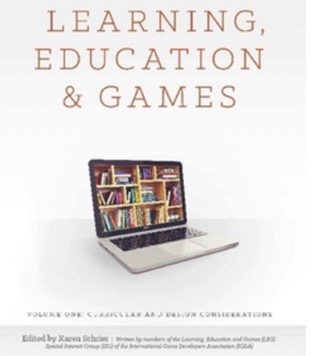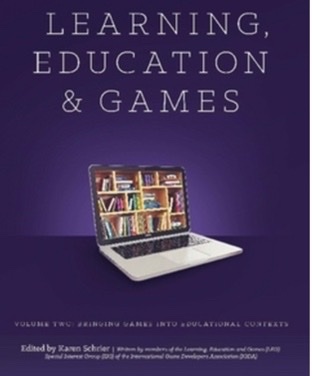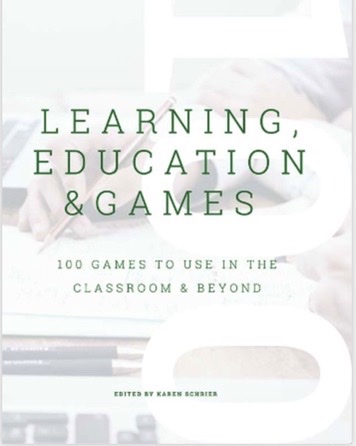Learning, Education, & Games Volume 4: 50 Games to Use for Inclusion, Equity, and Justice
Editors: Dr. Karen “Kat” Schrier, Dr. Rachel Kowert, Dr. Diana Leonard, & Tarja Porkka-Kontturi
Publisher: ETC Press/Carnegie Mellon
Brief summary
For the fourth volume of the Learning, Education, & Games series, we aim to create a practical guide for how to use games for supporting inclusion, compassion, care, equity, and justice—in the classroom and beyond. This is a guide, aimed at educators, who want to use games that create inclusive communities, and enhance equity and justice for marginalized students.
The guide will include at least 50 case studies of games/interactive experiences that could be used for education (including K-12, preschool, and higher education).
The focus will be on anti-racist, inclusive, and equitable uses and designs of games. This includes how to use games not explicitly designed for inclusion, as well as how to incorporate games that are purposefully designed for inclusion in some way.
Curricular and Design Considerations (Volume 1)
The first volume in the series focused on the design and curricular considerations related to creating and using games for learning, such as designing for diverse audiences or designing for social studies, STEM, or music learning. The book also delves into specific design issues, such as aligning goals, designing for an audience, playtesting, and assessment.

Bringing Games into Educational Contexts (Volume 2)
The second volume focused on the challenges of creating games and implementing them in educational settings, and covered issues such as gamification, using games to support students with ASD (autism spectrum disorder), selecting games for the classroom and library, homeschooling, working with parents and policymakers, and choosing the right tools for game development.

100 Games to Use in the Classroom & Beyond (Volume 3)
The third volume in the series features 100 different case studies of games that can be used to teach all different types of skills, behaviors, and topics. For instance, we have short case studies on games such as Minecraft, Chutes and Ladders, Fable III, Thunderbird Strike, Pandemic, and Fortnite.

Editor Bios
Kat Schrier
Dr. Kat Schrier (@drgamermom) is an Associate Professor and Founding Director of the Games & Emerging Media program at Marist College. Dr. Schrier has authored or edited over 100 scholarly publications and educational materials. She edited the previous books in the Learning, Education & Games series, published by ETC Press. Her book, Knowledge Games: How Playing Games Can Help Solve Problems, Create Insight, and Make Change, was covered by Forbes, New Scientist, and Times Higher Education, and SiriusXM. Her latest book, We the Gamers: How Games Teach Ethics & Civics, was published by Oxford University Press (press coverage here). Prior to Marist College, she produced media and games at Scholastic, Nickelodeon, and BrainPOP. Dr. Schrier continues to consult on many digital properties, such as McGraw-Hill’s Quest: Journey through the Lifespan and LuvBug Learning. Her research focuses on games, learning, bias reduction, and compassion. For instance, as a Belfer Fellow with the ADL’s Center for Technology & Society she authored Designing Ourselves. She is currently working on a Templeton Foundation Grant, which involves creating VR games for Nigerian youth, and she is consulting with the World Health Organization (WHO) as a game designer. She holds a doctorate from Columbia University, master’s degree from MIT, and a bachelor’s degree from Amherst College.
Rachel Kowert
Rachel Kowert, Ph.D is a research psychologist and the Research Director of Take This. She is a world-renowned researcher on the uses and effects of digital games, including their impact on physical, social, and psychological well-being. An award-winning author, she has published a variety of books and scientific articles relating to the psychology of games and, more recently, the relationship between games and mental health specifically. Her published works include peer-reviewed books such as Video Game Debate, Video Game Debate 2, and Video Games and Well-being: Press Start, as well as community-focused books such as A Parent’s Guide to Video Games, and Pragmatic Princess. Recently, she founded her YouTube channel Psychgeist, which serves to bridge the gap between moral panic and scientific knowledge on a variety of psychology and game-related topics. Dr. Kowert has been featured in various media outlets, including NPR, the Washington Post, the Wall Street Journal, the Atlantic, Wired, and video game publications such as Kotaku and Polygon.
Diana Leonard
Dr. Diana Leonard is an Associate Professor of Psychology at Lewis & Clark College. She received her Ph.D. in Psychology from UC Santa Barbara with an emphasis in college and university teaching. Her scholarship engages with intergroup conflict resolution and group dynamics, including in live-action role-play communities. Her recent work draws on perspective-taking research to frame the risks and rewards of portraying marginalized experiences in larp. Dr. Leonard has extensive experience as a GM and player for both larp and tabletop RPG, and she has used role-play as a teaching technique for the past decade.
Tarja Porkka-Kontturi
Working as Director of Community Engagement at Global Game Jam, Games and Events Producer as contractor, and Business Development Manager at The International Games Summit on Mental Health, Tarja Porkka-Kontturi is a games PR and marketing expert at Games Branding. She also volunteers as a Vice President at We in Games Finland, and serves as a diverse game developers mentor and Game Credits SIG Board Member at IGDA. Establishing her own consultancy company Tarja P-K, she advises game development studios and companies on accessibility, inclusion and diversity.